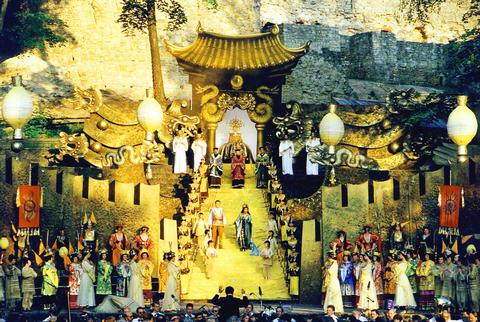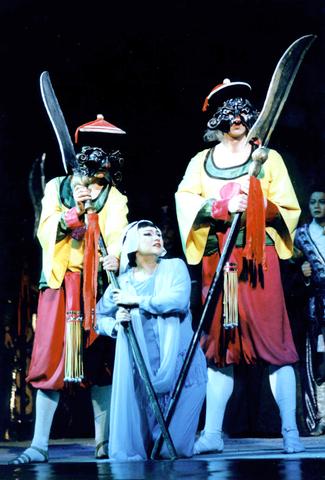Western opera in Taiwan is a bizarre phenomenon. Tickets are sometimes cheap, sometimes expensive, and the quality of the production often bears little relation to the ticket price.
The production of Puccini's Turandot by the Latvian National Opera opening in Taipei tonight is the third time this piece will be seen in Taiwan in the past four years. A version from Beijing was here in 1998, and last year saw a home-grown production sponsored by Taipei City government.
Since the tiny Baltic republic of Latvia voted to break away from the former Soviet Union in 1990, its national opera company has undertaken onerous touring schedules, possibly to shore up the finances of the fledgling state. This is its second in Taiwan, having first come in September, 1999, with Bizet's Carmen.

PHOTO COURTESY OF PARIS INTERNATIONAL
"This production is 25 years old," said company tour manager Dace Bula. "It therefore dates from the Soviet era. But it's been very popular and so we haven't changed anything, though we've renovated the costumes where necessary. This is the first time it's been seen in a Chinese community, and I hope you'll bear with us.
"The picture on the poster is of an outdoor version we've performed in Latvia and Sweden. What you will see will not be quite as grand."
The group's arrival in Taiwan has been accompanied by some dissenting voices, however. One was from the Austrian musician Werner Kastner, a percussionist with the National Symphony Orchestra.

PHOTO COURTESY OF PARIS INTERNATIONAL
"The prices being charged are on a level with those you might pay in Vienna or New York to hear some of the finest singers and orchestras in the world," he said. "Yet these soloists are certain to be inferior to what you would expect to hear in even quite small opera houses in Germany, Austria or Italy. And the orchestra and chorus will be only half the size you have in the major operatic centers."
Ticket prices for Turandot range from NT$4,800 to NT$600 in Taipei, and from NT$3,600 to NT$600 elsewhere. The orchestra of the Latvian National Opera numbers 68, and the chorus has 50 singers, said the agency inviting them, Paris International Entertainment, based in Kaohsiung.
Against such a view as Kastner's, it can be argued that touring something as cumbrous and labor-intensive as opera is an expensive business. Scenery, costumes and musical instruments all have to be brought in, and 131 personnel transported, fed and accommodated.
Local opera productions, such as the artistically outstanding La Boheme mounted by Taipei City last October, are by contrast not only generously subsidized, but less expensive to stage. The top price for tickets for La Boheme was NT$1,000.
Members of the company who were here with Carmen in 1999 remember good technical facilities in Taiwan's theaters, and especially appreciated the audience response.
"People were very attentive, following the story closely, and there was a very positive reaction to what was happening on stage," said Ieva Kepe, one of the two sopranos taking the title role of the frigid Chinese princess Turandot. "It added up to a very pleasant atmosphere."
As is usual with opera everywhere, the major roles in this Turandot have been double cast to alleviate strain on the soloists' voices. Many international opera celebrities refuse to sing more than three times a week, but stress does not appear to worry the stalwart Latvians. Irena Milkeviciute, for example, will sing the title role of the Chinese princess on three consecutive nights in Taipei, and two consecutive nights in Taichung and Tainan. Ieva Kepe will sing in the remaining three performances.
The opera's other lead soprano role, the slave girl Liu, is also divided, again unequally, between two Latvian singers, Kristine Gailite and Zigrida Krigere.
And the part of the central Asian prince Calaf, who sues for Turandot's hand in marriage (and hence control of the entire Chinese empire) at the risk of beheading if he answers any of her three riddles incorrectly, will be shared by the Ukranian tenor Oleg Kulko and Mario Diaz from Chile.
Taipei, Kaohsiung and Taichung regularly host four or five Western operas a year. Such events are less familiar in Tainan, however, and a substantial number of tickets for the two performances there are still available.
Latvia is a republic in northeastern Europe, approximately twice the size of Taiwan but with a population of under 3 million. Its capital Riga was for centuries a prosperous Baltic port, and as a result it has a long operatic tradition. Several of Mozart's operas were produced there not long after their Viennese premieres, and the young Richard Wagner was music director of the opera house for two years in the 1830s.
This visit by the Latvian Opera is exclusively to Taiwan, Paris International Entertainment said, and is not part of a wider Asian tour.

On April 26, The Lancet published a letter from two doctors at Taichung-based China Medical University Hospital (CMUH) warning that “Taiwan’s Health Care System is on the Brink of Collapse.” The authors said that “Years of policy inaction and mismanagement of resources have led to the National Health Insurance system operating under unsustainable conditions.” The pushback was immediate. Errors in the paper were quickly identified and publicized, to discredit the authors (the hospital apologized). CNA reported that CMUH said the letter described Taiwan in 2021 as having 62 nurses per 10,000 people, when the correct number was 78 nurses per 10,000

As we live longer, our risk of cognitive impairment is increasing. How can we delay the onset of symptoms? Do we have to give up every indulgence or can small changes make a difference? We asked neurologists for tips on how to keep our brains healthy for life. TAKE CARE OF YOUR HEALTH “All of the sensible things that apply to bodily health apply to brain health,” says Suzanne O’Sullivan, a consultant in neurology at the National Hospital for Neurology and Neurosurgery in London, and the author of The Age of Diagnosis. “When you’re 20, you can get away with absolute

May 5 to May 11 What started out as friction between Taiwanese students at Taichung First High School and a Japanese head cook escalated dramatically over the first two weeks of May 1927. It began on April 30 when the cook’s wife knew that lotus starch used in that night’s dinner had rat feces in it, but failed to inform staff until the meal was already prepared. The students believed that her silence was intentional, and filed a complaint. The school’s Japanese administrators sided with the cook’s family, dismissing the students as troublemakers and clamping down on their freedoms — with

As Donald Trump’s executive order in March led to the shuttering of Voice of America (VOA) — the global broadcaster whose roots date back to the fight against Nazi propaganda — he quickly attracted support from figures not used to aligning themselves with any US administration. Trump had ordered the US Agency for Global Media, the federal agency that funds VOA and other groups promoting independent journalism overseas, to be “eliminated to the maximum extent consistent with applicable law.” The decision suddenly halted programming in 49 languages to more than 425 million people. In Moscow, Margarita Simonyan, the hardline editor-in-chief of the